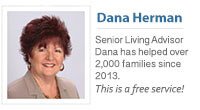The Book of Shame - Ensuring Better Care for Your Loved One

Summary: Jayme describes a very powerful and effective tool (The Book of Shame) that families can use to help ensure that their loved ones are well cared for in an assisted living facility or other long-term care environment.
Author: Jayme Kinsey exclusively for Assisted Living Directory. Jayme is a freelance writer with over ten years experience caring for the elderly and mentally disabled adults..
Jayme is a contributor for Assisted Living Directory
 “Will my loved one be well cared for?”
“Will my loved one be well cared for?”
This question is on many people’s minds as they make preparations to move their loved ones to an assisted living or long-term care facility. Usually, the question has nothing to do with quality medical care–but rather the one-on-one care they will receive every day from medical professionals.
With incidents of elder abuse on the rise, {http://www.ncea.aoa.gov/Library/Data/index.aspx} this question is very important.
The truth is that all facilities (regardless of what type) are different. For the most part, staff members aren’t intentionally abusing elders. Rather, they are forced to neglect their needs in facilities that are under-staffed. Despite state regulations on the resident-to-staff ratio, many facilities “fudge” on this issue, leaving far too few people on the floor caring for far too many residents.
Still, as a family member, you want to be sure that your loved one is receiving all the care that they are paying for. Are all the services that were promised being performed?
Many families are resorting to spy cams to catch neglect, as well as physical and verbal abuse. This may or may not be allowed in your facility of choice. Or, it may not be in your budget.
Locally, a few families have started using something they call a “Book of Shame”, rather than cameras. This tool isn’t to capture hard evidence of any serious crime, though. Rather it is a soft preventive for minor offenses. So far, it has been very effective.
The Book
One family started with a plain notebook that they kept in their loved one’s room. During daily visits, they noted everything they saw, both positive and negative. Whoever made the entry for the day signed and dated their statement.
Because they left the book lying out, it was perused by medical staff. This was actually a good thing. Every shift that checked in was allowed to read what the family was noticing, what they liked, and what they disapproved of.
Another family took the idea a step farther by adding photos to the book. If they came in and found an unsuitable environment, a suspicious mark, or an otherwise questionable situation; it was photographed, signed and dated. An entry describing what was found in the room was left as well.
How The Book Created A Better Care Environment
The Book of Shame might not always work, depending on the facility. But here, it saved several residents from a careless aide. By recording what they saw over the course of the week, and presenting the book and photos, a staff member was fired and subsequently lost her certification.
Thankfully, management was more than willing to listen and take action. What was even better was that just the presence of the book was enough to motivate other staff members to provide better care without cutting any corners.
Things to Note
This tool is easy to implement. It only takes a notebook, a pen, and a few photo prints. It is, however, important that visitors write down important points, rather than rambling on about things that are out of the control of the care providers.
It also takes some observation skills, and a little patience. (For those with limited time or who visit infrequently, a voice recorder might be a better option.)
- Cleanliness of the room
- Are all services being provided (depending on facility and level of your loved one’s needs)
- Were staff members friendly as well as efficient?
- Were staff members courteous?
- Overall appearance of loved one (well-groomed and happy? Or slovenly and agitated?)
- Did loved one seem nervous?
- Were all safety features being properly used?
- Were all personal items as they should be?
- Activities
Some important aspects to note include:
Accentuate The Positive, Too
It is very easy for family members to focus on all the wrongs they see, and forget to mention what they DO like. It is just as important to list positive aspects of the visit.
Here is a sample of an entry based on a friend’s Book of Shame:
“Arrived at 4:30 pm. Dad was just coming out of the shower. He seemed alert and happy today. Room is clean, bed was unmade. We walked outside, Dad showed me his personal garden and the bird houses they made yesterday.
Laura (the aide) came to tell Dad to come to dinner. She was impatient and raised her voice slightly to get him to hurry. Dinner looked and smelled delicious. Adrian (another staff member) helped dad to his table and set him up to eat. She was very friendly, and made sure he was comfortable and had everything he needed, as well as the other gentleman at table.
I left Dad eating and talking with his friends. Will visit again Monday. “
Be Proactive in Your Loved One’s Care
The best way to prevent neglect and abuse of the elderly is to be proactive in their care. Whether they are semi-independent in assisted living, or bed-bound in a skilled nursing facility, being part of their life is not just comforting, it can be life-saving.
Be visible. Be vocal. And yes…use any method necessary to guarantee a safe and happy life for your loved one. Please remember, though, that a “Book of Shame” is not the place to report suspected physical, mental, sexual or verbal abuse. Any violence, even if it is only suspected, should be reported immediately!
Use the Book of Shame idea instead to answer that all important question: Will my loved one be well cared for?
Copyright © 2014 By Jayme Kinsey
Article by Jayme Kinsey exclusively for Assisted Living Directory
Responses to this article:
Comment Soon:
No Obligation
Assisted Living with The Book of Shame - Ensuring Better Care for Your Loved One




